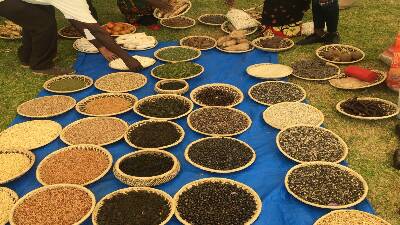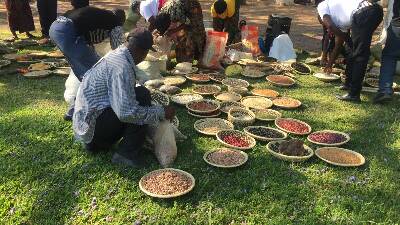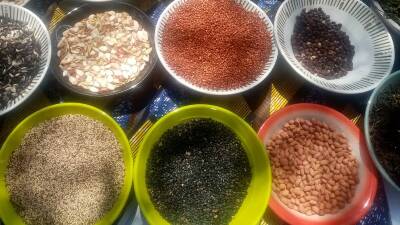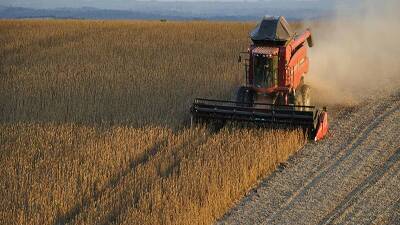Food Sovereignty Ghana fights for right to seeds
Ghana adopted a patent protection law in 2020 which criminalizes farmers who save and sell patented seeds, threatening draconian jail sentences of up to ten years. The grassroots movement Food Sovereignty Ghana (FSG) has challenged the law in court and the undue protection it gives to genetically modified (GM) seeds, notably GM versions of the country’s staple cowpea crop.
Food Sovereignty Ghana argues that the Plant Variety Protection Act hands control of seeds to multinational corporations, making small hold farmers dependent on expensive seeds, fertilizers and pesticides – and decimating traditional agroecological practices.
In a discussion with FIAN International, Edwin Baffour from Food Sovereignty Ghana explained why the law is problematic. Excerpts of the discussion are below. A full version of the interview can be viewed here.
What is your main criticism of Ghana’s Plant Variety Protection (PVP) Act?
In an unprecedented manner, Ghana is proposing and telling the world that anyone who is found exchanging, saving or selling patented seeds can get a minimum sentence of 10 years. Now this is an unprecedented sentence. I believe that in the US where Monsanto operates this is a two-year sentence. But here the state is stepping in to support the criminalization of farmers. The state is using its apparatus to achieve what civil suits on behalf of private companies should achieve.
We think that the PVP Act is also going against international obligations that Ghana has signed up to, for instance the International Treaty on Plant Genetic Resources for Food and Agriculture (ITPGRFA) and the Nagoya Protocol. These are all protocols that enjoin Ghana to protect the rights of smallholder farmers to be able to save, sell and exchange seeds. So, we believe these are not good precedents to be set in a country that believes in freedom and justice, believes in equal rights of its citizens …
Almost 50 percent of the population of Ghana are somehow connected to farm work, [and] if this kind of very rigid 10 year minimum sentence is going to apply, even for those of us who work in the industry it is difficult to recognize a pile of GM cowpeas and a pile of conventional cowpeas. So, there’s a very big grey area and it’s an uncomfortable situation we find ourselves in.
In what way does the act criminalize farmers’ seeds management practices?
Anyone found saving, selling or exchanging these seeds … the patented ones, stands the risk of a minimum 10-year sentence. Now first of all the communities that this germ plasm was taken from do not benefit anything from these commercial agendas.
So how it is that these very companies who turn around, tweak it genetically and then claim to have a patent are able to come back into the same country – from where that germ plasm was taken – and criminalize its communities and its farmers …? We believe that the criminalization of farmers in that sense goes against our commitments in the international sphere. We’ve signed treaties that commit us to protect their rights.
What do you want the government to do?
First of all the government needs to ensure that the rights of farmers as it has signed up to, in treaties such as the ITPGRFA, is followed. That the rights of farmers to sell, save and exchange seeds is respected. Any legislation that goes against what we have already committed to should be null and void.
There needs to be mechanisms built into any plant variety protection act which ensure that there is no bio piracy. In the current form of the act this would just encourage the loss of Ghana’s biodiversity to entities that exist just for purely commercial interests. And there’s no benefit sharing scheme for the communities that have developed some of these seeds over millennia. We want to see a responsibility for those communities who have developed these varieties for so long. This act clearly does not have that.
We believe that the act should be more considerate to the rights of farmers to grow the food that they want. And … large producers for whom the bill is really made, they’re waiting for such legislation so that they can move into Ghana to take over the seed market, to have a very formal seed sector which will mean a loss of biodiversity. It will mean a loss of hundreds of varieties of different crops because of what the uniformity of business will do to the agricultural sector.
You have taken legal challenges on GMOs before and now on the PVP Act. Why did you choose this strategy and what do you hope to achieve?
Given the African context, the fact that there is this massive [agribusiness] lobby for the control of seeds and food systems you find that different stakeholders have been compromised by the lobby.
So for instance, the media in Ghana does not talk much about GMOs and does not talk much about these issues because there’s been heavy lobbing of the media to believe the agenda of agribusiness: that the population of the world is soon going to overtake us, there’s going to be hunger, we can’t feed ourselves. And they never talk about the politics of the distribution of food and the other issues that make food not accessible to some.
So, we find ourselves struggling to get our voice heard and one of the easiest ways is to move to court so that your actions are still legitimate but hopefully forceful enough so that stakeholders are forced to comply in the event of a court order …
We’ve been in court since 2015 – the wheels of justice grind slowly but it’s been an effective way to engage because without that we are also made to seem irrelevant on the landscape. A few scientists, a few media here and there say a few words about FSG in order to sort of label us in this category that we do not know what we are talking about, that we only oppose science for the sake of opposition – without critically stopping to learn and understand the reasons that we give for the positions that we’ve held since we started as a civil society organization.
So, it was a very good idea that we went to court because that becomes an official engagement and people are forced to hear. Maybe a media house that has been compromised and don’t usually play stories about GMOs and these agricultural policies but the fact that a court has given an order if you want to continue to be a credible media house then you have to cover our story – you have to announce that this is what happened in court.
However, even with the courts we are still limited with the speed that the courts work in this part of the world: very extremely slow … going to court has its challenges but it still remains one of the most legitimate means of engaging the public and the nation on this.
There is still however a lot of education that needs to be done … there’s still a lot of people in Ghana who are not aware of what GMOs are, they’re not aware of the issues, of their rights and access to food. They’re not aware of issues of bio piracy and so on so we’re hoping that while we fight the case in court we’ll continue to be able to do our advocacy work and hopefully get more listening ears.
What do you think you can achieve?
We think the case we have is quite straightforward when it comes to issues that we’ve raised – when it comes to risk assessment … questions about the availability of epidemiological studies to verify the safety claims being made. These are quite straightforward if they are looked into in detail.
We’re hoping that the court in its wisdom will be able to pay attention to the materials that we provided as evidence, as well as what our scientists witnesses have said … And obviously they don’t agree that Ghana should be going down the road of GM with the cowpea, given that it’s a staple crop, given that there has not been enough risk assessment on the effects of commercially releasing a genetically modified cowpea on other endemic species in Ghana.
There have been no results on the effects on non-target organisms that would end up eating this toxic cowpea. And, so for those reasons we believe that if the court has the opportunity to apply the law … we believe we have made a good case. We’re actually still in the process.
Can you say some more about your opposition to the PVP Act?
We continue to challenge it in the Supreme Court.
We believe that UPOV is a very rigid and inflexible regime, that it merely exists to open the doors for companies that will boost the economies of certain countries to come into other smaller countries and dominate the seed market.
This, we believe does not inure to the long term benefit of Ghana’s food security and the citizens of Ghana will resist such attempts to control their food sources, especially with a staple like the cowpea which is responsible for so many dishes, so many ceremonies, so many traditional rituals. Food is more than just what we eat. It has symbolism; it’s a store of wealth.
And we believe that these PVPs are insensitive to the realities on the ground, how these cowpeas interact with farmers in their real lives, such that they can now criminalize farmers who end up saving, or exchanging or selling them.






